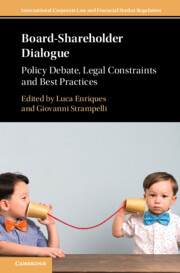Book contents
- Board-Shareholder Dialogue
- International Corporate Law and Financial Market Regulation
- Board-Shareholder Dialogue
- Copyright page
- Contents
- Contributors
- Foreword
- The Dialogue between Corporations and Institutional Investors
- 1 The New Corporate Governance
- 2 Shareholder Voice and Corporate Purpose
- 3 The Purpose of Corporate Purpose Statements
- 4 Systemic Stewardship with Tradeoffs
- 5 Giant Asset Managers, the Big Three, and Index Investing
- 6 Something Old, Something New
- 7 The Perils and Promise of Shareholders as Stakeholder Advocates
- 8 How to Facilitate ESG Investor Engagement
- 9 Emerging ESG-Driven Models of Shareholder Collaborative Engagement
- 10 ESG and Board-Shareholder Engagement in M&A
- 11 How Does Board-Shareholder Engagement Really Work?
- 12 Shareholder Engagement inside and outside the Shareholder Meeting
- 13 The Viability of Blockchain in Corporate Governance
- 14 Shareholder Engagement in East Asia
- 15 Board-Shareholder Engagement and Directors’ Appointments
- 16 Shareholder Proposals and the Debate over Sustainability Disclosure
- 17 Board-Shareholder Engagement and Disclosure Obligations under Corporate Governance Codes
- 18 Board-Shareholder Engagement and Insider Regulation
- 19 Market Soundings Rules
6 - Something Old, Something New
Cultivating Institutional Investor Engagement through Shareholder Stewardship
Published online by Cambridge University Press: 31 August 2024
- Board-Shareholder Dialogue
- International Corporate Law and Financial Market Regulation
- Board-Shareholder Dialogue
- Copyright page
- Contents
- Contributors
- Foreword
- The Dialogue between Corporations and Institutional Investors
- 1 The New Corporate Governance
- 2 Shareholder Voice and Corporate Purpose
- 3 The Purpose of Corporate Purpose Statements
- 4 Systemic Stewardship with Tradeoffs
- 5 Giant Asset Managers, the Big Three, and Index Investing
- 6 Something Old, Something New
- 7 The Perils and Promise of Shareholders as Stakeholder Advocates
- 8 How to Facilitate ESG Investor Engagement
- 9 Emerging ESG-Driven Models of Shareholder Collaborative Engagement
- 10 ESG and Board-Shareholder Engagement in M&A
- 11 How Does Board-Shareholder Engagement Really Work?
- 12 Shareholder Engagement inside and outside the Shareholder Meeting
- 13 The Viability of Blockchain in Corporate Governance
- 14 Shareholder Engagement in East Asia
- 15 Board-Shareholder Engagement and Directors’ Appointments
- 16 Shareholder Proposals and the Debate over Sustainability Disclosure
- 17 Board-Shareholder Engagement and Disclosure Obligations under Corporate Governance Codes
- 18 Board-Shareholder Engagement and Insider Regulation
- 19 Market Soundings Rules
Summary
This chapter delves into the ongoing debate surrounding institutional investor engagement, spanning sporadic voting to strategic shareholder activism. Focusing on the stewardship role of institutional investors as shareholders, referred to as shareholder stewardship, it contextualizes this in a historical context within corporate governance. The focus is placed on micro-level shareholder stewardship – how institutional investors monitor and engage with specific companies in their portfolios – emphasizing its alignment with traditional notions of shareholder engagement. The chapter illustrates that micro-level shareholder stewardship extends beyond mere investor engagement. It involves firm-level shareholder engagement to improve long-term company performance, alongside a commitment to meeting ultimate beneficiaries’investment needs and serving public interests, such as addressing saver needs and mitigating externalities, like climate change. Furthermore, the chapter identifies hedge-fund-style activists as key players in micro-level shareholder stewardship, offering new empirical evidence on their global scale. Despite variations, a category of investors – the activist shareholder stewards – emerges from stewardship disclosures, fulfilling the stewardship role in corporate governance.
Keywords
- Type
- Chapter
- Information
- Board-Shareholder DialoguePolicy Debate, Legal Constraints and Best Practices, pp. 185 - 213Publisher: Cambridge University PressPrint publication year: 2024
- 1
- Cited by

